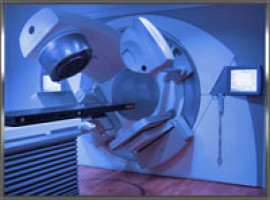
By Professor Gordon Wishart, Chief Medical Officer at Check4Cancer, Visiting Professor of Cancer Surgery at Anglia Ruskin School of Medicine
• The recently published FAST-Forward study (28.4.20) has confirmed that a one-week radiotherapy schedule is as safe and effective as the standard 3-week schedule.
• The results provide major benefits for patients in terms of convenience, reduced treatment time, and reduced costs for health services globally.
• Since 2009, a 3-week course of radiotherapy has been the international standard of care following surgery for early-stage breast cancer.
• With reduced NHS capacity for cancer treatment during the COVID-19 lockdown, and government guidance to minimise hospital visits and increase patient safety, this study is likely to be adopted into routine practice quickly throughout the UK.
The UK FAST-Forward radiotherapy study, led by the Institute of Cancer Research and published in the Lancet1 on 28 April 20201, has confirmed that a one-week course of radiotherapy for women treated by breast conserving surgery (lumpectomy) or mastectomy is just as safe and effective as the standard 3-week schedule.
The study, performed in 97 hospitals throughout the UK, compared two shorter courses of radiotherapy with the standard 3-week course, which delivers a total dose of 40 Gray (Gy) in 15 fractions.
With 5 years of follow-up, the study has now reported that a one-week schedule, that delivers a reduced dose (26 Gy) over only 5 fractions in a single week, is just as effective in preventing local recurrence of the breast cancer, with equivalent side effects on normal breast tissue.
This study provides major benefits for patients in terms of convenience and reduced treatment time, with reduced costs for health services globally.
In the last 20 years the UK has suffered from inadequate radiotherapy capacity as cancer incidence has risen, with breast cancer patients being one of the main user groups of radiotherapy services.
With reduced NHS capacity for cancer treatment during the COVID-19 lockdown, and government guidance to minimise hospital visits and increase patient safety, this study could not have been published at a better time.
The Association of Breast Surgery announced that the results of the study, “have immediate clinical significance and should translate into safe, rapid change to clinical practice”2.
Furthermore, the one-week schedule should increase the throughput at radiotherapy centres throughout the UK for patients whose treatment has been delayed by the lockdown and as a result, this shorter treatment should accelerate early adoption of this landmark study into routine clinical practice.
Background
Following publication of a number of trials, including the UK START trials in 2008, a 3-week course of radiotherapy has been the international standard of care following breast conserving surgery (lumpectomy) or mastectomy for patients with early-stage breast cancer.
Radiotherapy is part of the “local treatment” following breast cancer surgery and, is primarily intended to reduce the chance of the tumour returning in the breast of chest wall (local recurrence).
Breast radiotherapy can however cause a number of side effects to the remaining breast tissue including fibrosis & breast shrinkage, breast swelling and development of prominent blood vessels in the skin.
These changes can take many years to evolve and, further studies have therefore been performed to try to reduce these side effects that can result in worse overall cosmesis (disfiguring effects), while ensuring that the radiotherapy remains effective in controlling local recurrence of the original tumour.
In 2013, the Cambridge IMRT study3 reported that by using different delivery techniques (Intensity Modulated Radiotherapy – IMRT) following breast conserving surgery (lumpectomy), the radiation dose could be standardised across all areas of the breast, thereby improving overall breast cosmesis.
This study was practice-changing across the UK and led to the adoption of IMRT in many radiotherapy centres.
In 2017, the UK IMPORT Low study reported that the total radiotherapy dose could be safely reduced by targeting the radiotherapy to the site where the tumour had been located in the breast, as well as lowering the dose to the surrounding breast tissue4.
The study showed that the IMPORT (Intensity Modulated Partial Organ Radiotherapy) technique, with partial-breast and reduced-dose delivery, was just as effective as whole-breast radiotherapy in controlling local recurrence and furthermore, patients had less adverse effects on their remaining breast tissue.
References:
1. Brunt AM, Haviland JS, Wheatley DA et al. Hypofractionated breast radiotherapy for 1 week versus 3 weeks (FAST-Forward): 5-year efficacy and late normal tissue effects results from a multicentre, non-inferiority, randomised Phase 3 trial. Lancet ,28 April 2020.
https://www.thelancet.com/action/showPdf?pii=S0140-6736(20)30932-6
2. Association of Breast Surgery (ABS). https://associationofbreastsurgery.org.uk/professionals/research/news-and-hot-topics/
3. Mukesh MB, Barnett GC, Wilkinson JS, Moddy AM, Wilson C, Darling L, Hak CCW, Qian W, Twyman N, Burnett NG, Wishart GC, Coles CE. Randomized controlled trial of intensity-modulated radiotherapy for early breast cancer: 5-year results confirm superior overall cosmesis. J Clin Oncol 2013; 31: 4488-4495).
https://ascopubs.org/doi/full/10.1200/JCO.2013.49.7842?url_ver=Z39.88-2003&rfr_id=ori:rid:crossref.org&rfr_dat=cr_pub=pubmed
4. Coles CE, Griffin CL, Kirby AM et al on behalf of the IMPORT Trialists. Partial-breast radiotherapy after breast conservation surgery for patients with early breast cancer (UK IMPORT LOW Trial): 5-year results from a multicentre, randomised, controlled, Phase3, non-inferiority trial. Lancet, 2 August 2017.
https://www.thelancet.com/journals/lancet/article/PIIS0140-6736(17)31145-5/fulltext
The World Cancer Declaration recognises that to make major reductions in premature deaths, innovative education and training opportunities for healthcare workers in all disciplines of cancer control need to improve significantly.
ecancer plays a critical part in improving access to education for medical professionals.
Every day we help doctors, nurses, patients and their advocates to further their knowledge and improve the quality of care. Please make a donation to support our ongoing work.
Thank you for your support.